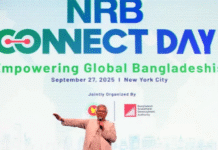
Dyeing and washing factories at Shyampur Kadamtali polluting Buriganga. Photo: Prothom Alo.
Dhaka’s river Buriganga is being polluted by washing and dyeing factories, according to the Department of Environment.
A report of the department back in 2015 shows a total of 60,000 cumecs untreated affluents pour into the Buriganga river. Out of that, 22000 cumecs come from tanneries and 900 cumecs from households.
Tanneries were responsible for 20 per cent of the pollution in Buriganga. The government relocated the tanneries to Savar, but the dyeing and washing factories are responsible for 25-30 per cent of pollution of the river. There are 122 dyeing and washing factories in the Shyampur Kadamtali industrial area, according to the Keraniganj Washing Owners Association and the Shyampur Kadamtali Washing Owners Association. There are other factories along with those 122 factories. None of them have Effluent Treatment Plants (ETP).
 Keraniganj Washing Owners Association president Kazi Abu Sohel and Shyampur Kadamtali Washing Owners Association president Syed Abu Hossain Babla do not deny the accusations against them about polluting the river.
Keraniganj Washing Owners Association president Kazi Abu Sohel and Shyampur Kadamtali Washing Owners Association president Syed Abu Hossain Babla do not deny the accusations against them about polluting the river.
According to the Keraniganj Washing Owners Association, each factory uses up to 25,000 to 30,000 litres of water every day, meaning 1.8 million litres of toxic affluence enters the the river.
An on-the-spot visit of the area revealed that the roads in front of the factories were submerged in polluted water. All this water flowed into Buriganga.
Shyampur Kadamtali Washing Owners Association leaders said the High Court had ordered WASA (Water Supply & Sewerage Authority) to take necessary steps to treat the polluted water, but WASA did not do so.
 WASA managing director Taksim A Khan told Prothom Alo that they could take any steps to treat the polluted water. Tthe factories would have to use ETPs, according to the law.
WASA managing director Taksim A Khan told Prothom Alo that they could take any steps to treat the polluted water. Tthe factories would have to use ETPs, according to the law.
The Shyampur Kadamtali Washing Owners Association president Syed Abu Hossain said they are taking steps to set up a central ETP.
Director general of the environment department Mohammed Raisul Alam Mandal told Prothom Alo “A small number of people are killing the river Buriganga for their own profits. Their factories were sealed a number of times and they were fined as well, but because of political influence, they simply start operating again.”
Source: Prothom Alo








